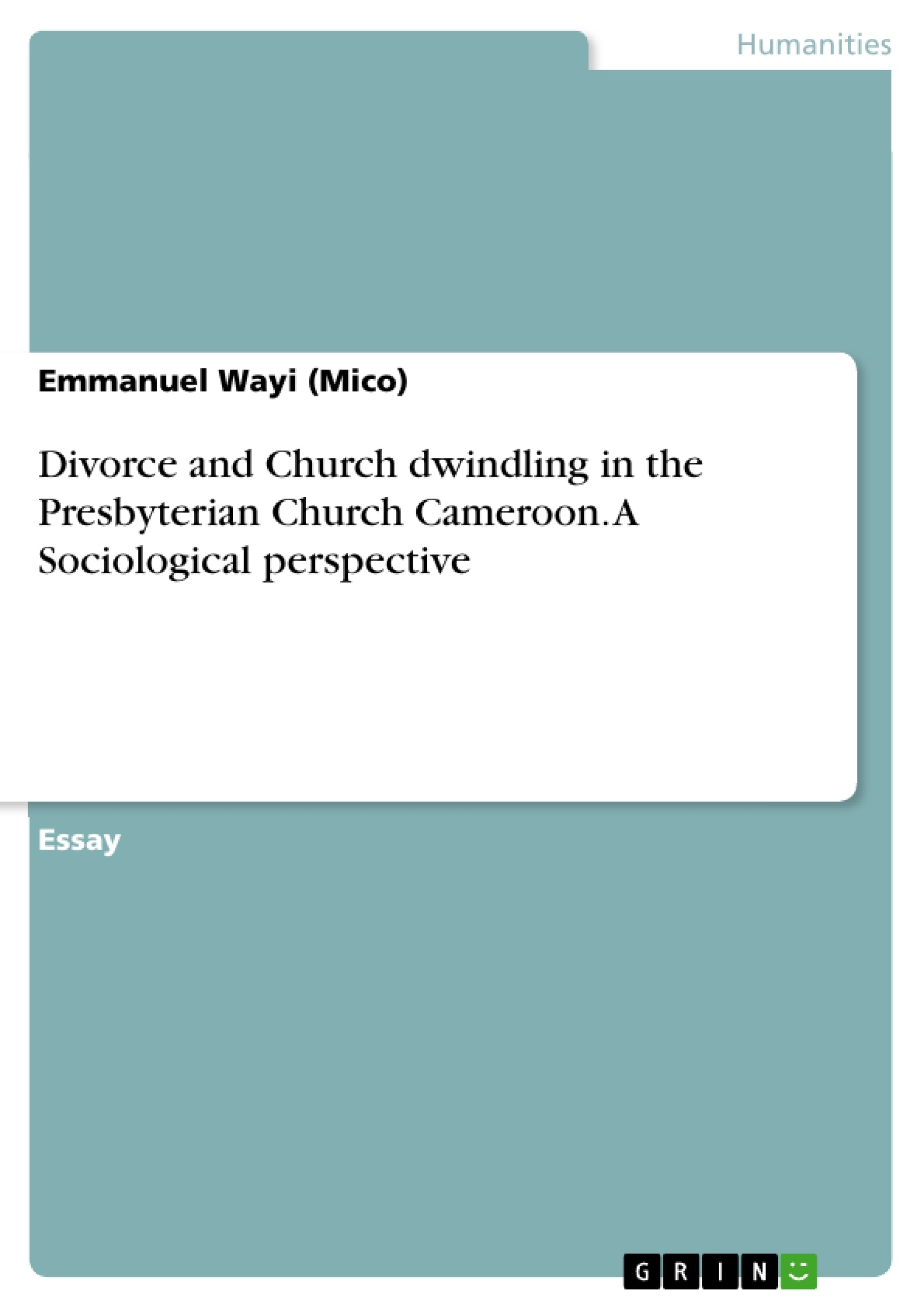This text contemplates the dwindling church attendance of young adults and the rising divorce rates in Cameroon.
The Presbyterian Church Cameroon used to pride itself as a church that had a grip of its Christians in matters of family life. Of recent, there have been strange winds blowing through the church such that even the clergy have had to face cases of divorce. What happened?
Secondly, the pews are getting empty everyday as the youths now prefer to stay at home to watch online preachers. What can the church do to better the situation?
Inhaltsverzeichnis (Table of Contents)
- INTRODUCTION
- THE PURPOSE OF THIS PAPER
- MAIN ISSUES
- A. The Biblical background of Divorce
- B. Divorce in the PCC
- C. Causes of Divorce within the PCC
- D. Effects of Divorce
- E. Proposed Recommendations on the Issue of Divorce
- CONCLUSION
- REFERENCES
- POSSIBLE CAUSES FOR THE DWINDLING CHURCH ATTENDANCE BY THE YOUTHS OF THE PCC ....
- INTRODUCTION
- 1) SOCIETAL INFLUENCE
- a) The world of entertainment
- b) Fashion
- c) Unemployment
- 2) TRADITIONAL CHURCH ACTIVITIES
- a) Negative and boring sermons.....
- b) The quest for miracles...
- c) Financial contributions/local rules of the church
- REFERENCES
Zielsetzung und Themenschwerpunkte (Objectives and Key Themes)
This paper aims to analyze the phenomenon of divorce within the Presbyterian Church in Cameroon (PCC), focusing on its biblical context, causes, effects, and potential solutions. It explores the issue as a social problem affecting the church and seeks to understand the perspectives of Christians regarding divorce.
- The Biblical Interpretation of Divorce
- Divorce Within the PCC
- Causes of Divorce in the PCC
- Effects of Divorce on Individuals, Families, and the PCC
- Recommendations for Addressing the Issue of Divorce Within the PCC
Zusammenfassung der Kapitel (Chapter Summaries)
The introduction provides a concise definition of marriage and highlights the problem of divorce within the PCC. It discusses the prevalence of divorce globally and emphasizes its impact on families, particularly children.
The "Purpose of This Paper" section outlines the paper's objective to analyze divorce within the PCC, considering its biblical context, causes, effects, and solutions. It also poses questions regarding the church's response to divorce and the potential for reconciliation.
The "Main Issues" section delves into the biblical background of divorce, examining different interpretations of biblical texts. It explores the historical context of divorce among the Jews and discusses contemporary scholarly perspectives on scriptural interpretations.
Schlüsselwörter (Keywords)
The paper focuses on the topic of divorce within the context of the Presbyterian Church in Cameroon, exploring its causes, effects, and potential solutions. Key themes include biblical interpretations, social problems, church response, reconciliation, and Christian ethics. The paper examines the impact of divorce on individuals, families, and the broader community.
Frequently Asked Questions on Church Attendance in Cameroon
Why is church attendance dwindling in the PCC?
Youths often prefer online preachers or are influenced by societal factors like entertainment, fashion, and unemployment.
How does the Presbyterian Church Cameroon view divorce?
While traditionally strict, the church is facing rising divorce rates even among the clergy, leading to a re-evaluation of its sociological and biblical stance.
What are the societal influences on the youth?
Factors include the world of entertainment, modern fashion trends, and the economic struggle of unemployment, which distance them from traditional church activities.
What are the "negative" church activities mentioned?
Boring sermons, high financial contribution demands, and rigid local rules are cited as reasons for the decline in participation.
What recommendations are proposed for the PCC?
The church needs to address the quest for miracles, modernize its communication, and focus more on the social and economic needs of its young members.
- Quote paper
- Emmanuel Wayi (Mico) (Author), 2016, Divorce and Church dwindling in the Presbyterian Church Cameroon. A Sociological perspective, Munich, GRIN Verlag, https://www.grin.com/document/336991



